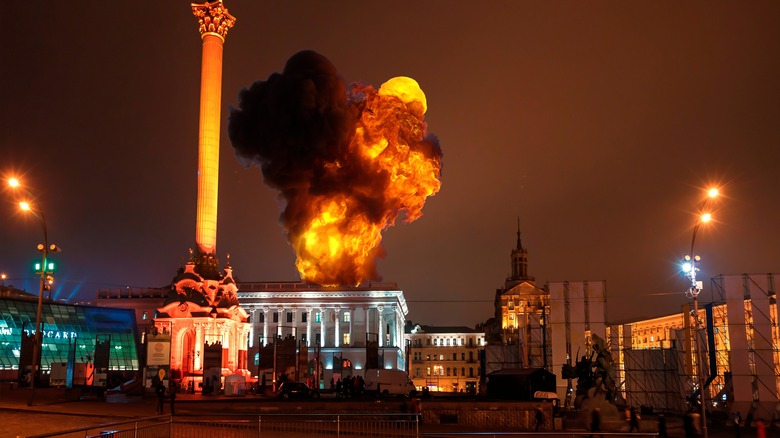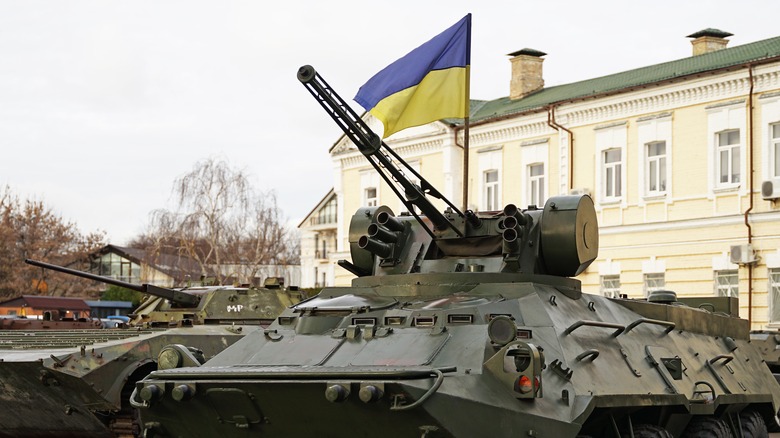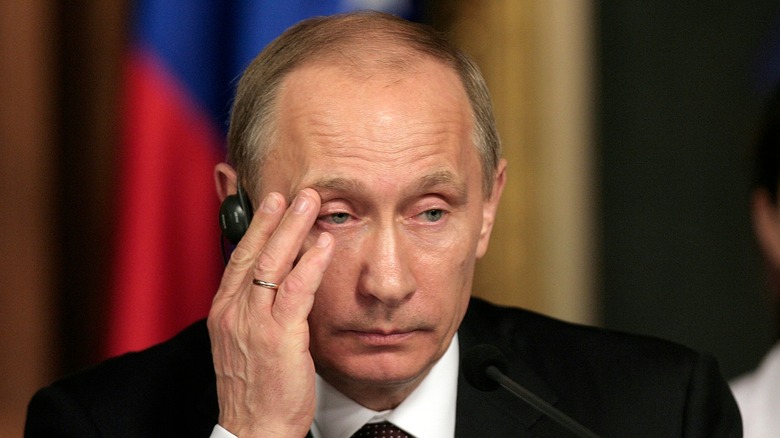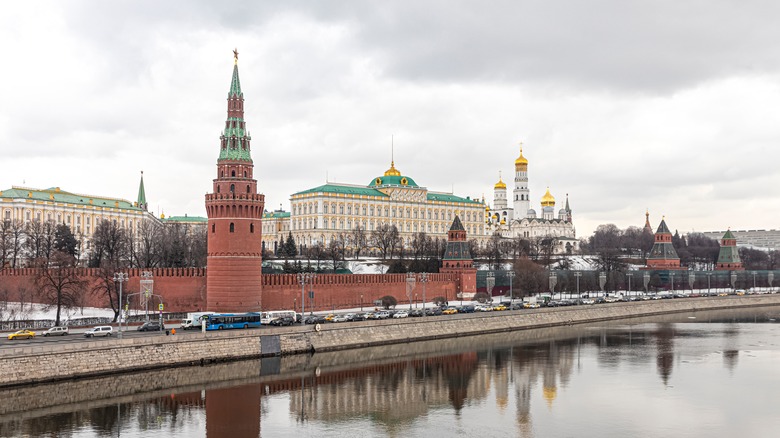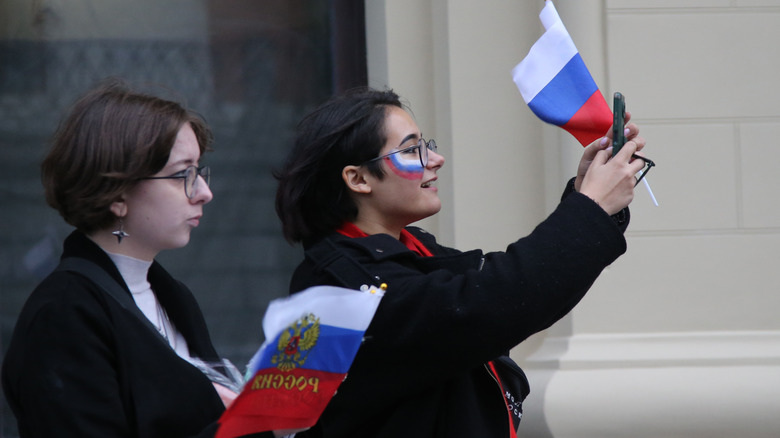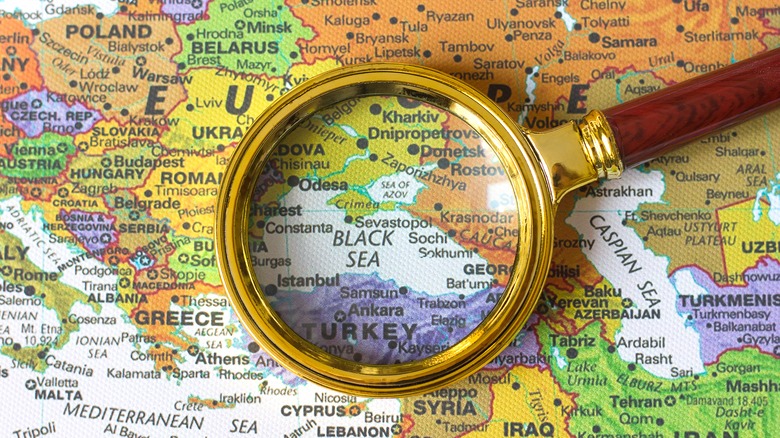What Really Happens When A Country Annexes Another?
On September 30, Vladimir Putin illegally annexed four regions belonging to Ukraine. As USA Today reports, the regions make up 15% of Ukrainian territory and encompass Zaporizhzhia, Luhansk, Kherson, and Donetsk. The annexation follows multiple other recent developments in the ongoing Ukraine-Russia war. As CNBC says, Russia is losing significant ground in the war, and Ukraine is beating back Russian invaders at every step in regions such as Lyman (via Newsweek). There might be hope yet on the horizon for Ukraine's President Volodymyr Zelenskyy.
With that being said, the latest annexation is undoubtedly cause for concern, as it signals Putin's driving desperation, as well as being a severe escalation of war tensions. According to The New York Times, the move is a direct reaction to Putin's significant defeats in Ukraine and might be his attempt at regaining military dominance. But what really happens when a country annexes another? What comes next for Ukraine? And what does this mean for the future?
What is annexation?
To put it simply, annexation is when another country takes sovereignty or control of another region or country, often through military conquest. As Britannica explains, reasons for annexations can be varied and complex. Different conditions will result in different outcomes, and a military occupation alone does not automatically mean annexation. A few examples of annexation include the 1938 German annexation of Austria, Russia's 2014 annexation of Crimea, and the Golan Heights annexation made by Israel in 1981. Annexation by use of illegal force is specifically condemned by the United Nations' charter (per Britannica).
Annexations in geopolitics have been around for a very long time. As Sky History notes, the ancient Roman Empire also took part in numerous annexations in its own time, which is part of why it was able to expand itself so much. Similarly, the United States annexed Texas in 1845 and Hawaii in 1898. There is no singular reason behind an annexation, though expansion of power and territory seem absolutely key to most situations.
How did Putin annex parts of Ukraine?
How did Putin illegally annex parts of Ukraine against international law? It all began with choreographed referendums executed by Russia a week prior. As The Washington Post explains, the Kremlin had been conducting coercive referendums throughout Russian-occupied territory in what many have called a sham vote. A referendum is simply when citizens are directly asked to answer yes or no to a political proposal. In this case, the referendum was asking citizens of occupied territory if they would like to be annexed by Russia. A few reports allege that many of these votes were done at gunpoint and with violence.
As NPR explains, the results of the referendums have largely been rejected worldwide, and Putin's decision to go forward with annexation is seen as illegitimate. So far, world leaders such as President Biden and António Guterres, the chief of the United Nations, have criticized Putin's actions. Ukraine leadership has also applied for what Volodymyr Zelenskyy calls accelerated NATO membership, hoping to speed up wartime support for extra protection on the front lines.
Putin's possible reasons for annexation
What would cause the president of Russia to commit something so patently illegal? There might be a few reasons, actually. As Time explains, military strategy is a big part of annexation as well. Putin has experienced setback after setback during the conflict, frustrating and halting his initial plays for a swift and absolute conquest of Kyiv. Putin might now be backed into a corner in regard to his available options. Some experts believe that this annexation is part of an effort to buy time, in order to reorganize the military for a more strategic attack.
Another big potential reason for this might be that Putin wishes to cripple Ukraine's outside support from other countries. An escalation such as this might actually work as a deterrent to other countries. As Foreign Policy says, world leaders like Biden have been very careful so far as to not provoke Putin too much. Given that Russia is a nuclear superpower, this might be a level-headed move to avoid nuclear war. Whatever the reasons may be, only time will tell where the annexation takes the conflict next.
What does Putin's annexation mean for the future?
As of now, Zelenskyy has vowed to continue working toward pushing back Russian forces, despite the lost territory annexed by Putin. What comes next is difficult to predict, but annexation shouldn't be taken lightly either way. As Newsweek explains, nuclear escalations might be at their highest than they have been since the Cold War. So far, Biden and his administration are treating the situation with caution, hoping that non-nuclear intimidation will help ease Putin's volatile temperament. A Pentagon officer had told Newsweek, "This is not about the use of a tactical nuclear weapon to turn the tide of the war. It is a signal, first to the United States and secondarily to NATO, not to continue the war into Russia, nor to threaten Putin directly."
As BBC says, the annexation will bring illegitimate border expansions to the Kremlin, which will have messy, decentralized internal government. As of now, the captured regions have been declared as Russia's territories, according to Putin, even though other nations do not recognize this legitimacy. It's not entirely clear how Putin will keep control of these regions or whether his control will last that long to begin with.
It's not the first time Russia has annexed territory from Ukraine
Though this new illegal annexation of Ukrainian territory may seem unprecedented, Russia had actually done something strikingly similar back in 2014. As CNBC explains, Ukraine was going through a turbulent time, with massive street protests, destabilized government, and the aftermath of the Revolution of Dignity. This made it a ripe target for Putin to strike. The Revolution of Dignity (per Maidan Museum) was a protest and coup against then-President Viktor Yanukovych over his alleged pro-Russian alliances. After Ukraine's president had fled the country, the country's government was left with a chaotic power vacuum for any group to fill the void.
As The Guardian says, Putin annexed the Crimean Peninsula on March 18, 2014, which provoked Ukraine to ramp up military defense as a rejection of the signed treaty. Like the annexation in 2022 performed by Putin, this too was widely demonized and rejected by many international governments, such as Germany, the United States, the European Council, and NATO. The move was similarly illegal and helped set the stage for the Ukraine-Russia crisis going on today.
